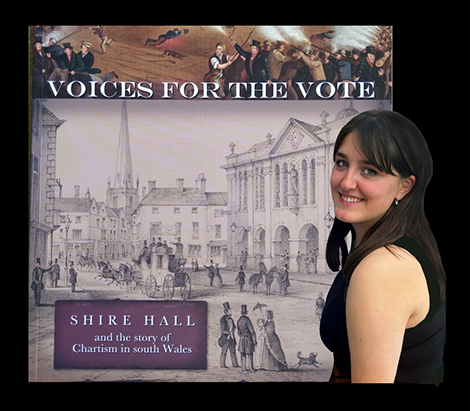

Grace French
For YOUR BOOKSHELF
Grace French writes:
It’s great news! Our Chartist Heritage Trust has commissioned a 2024 Reprint of the popular Voices for the Vote originally published by Shire Hall, Monmouth as part of its 2012 Renovation Project.
The English version is back on the shelves, for sale:
• At the Newport Rising Hub, 170, Commercial Street, NP20 1JN
• The Six Points Cardiff website
• And SOON again at Shire Hall, Monmouth.
Visually appealing, the authors have dug deep in the archives, museums and picture libraries. Its lush, 64 pages, of blended text and images, achieves a high quality print product. What’s not to like? Its £10 price is a bargain – available in Welsh or English language versions.
For me, a 21 year old graduate in English Lit (Cardiff Uni), this book is proving to be a treasure trove. At school in the Thames valley, ‘Chartism’ was never mentioned. Arriving a ‘fresher’ at Cardiff, family members in south Wales assured me that the Chartist movement was an important part of history, with consequences for today. Reading Dickens Hard Times, I came across a ‘Chartist’ for the first time, in literature – and George Elliot’s ‘radical’ Felix Holt made sense, once I realised his pedigree.
It’s not just a book that’s got the facts, Voices for the Vote answers crucial questions - What was Chartism? Who were the Chartists? What was the Charter?
Fundamentally empowering, the book is a celebration of ordinary people standing up for their rights in a society, where the Governing class represented an electorate of fewer than one in ten of the adult male population. They used the armed power of the state to prevent change. Bravely, over twenty people died at the Westgate Inn.
Voices focuses on the march of colliers and iron workers from the Monmouthshire coalfield valleys to Newport in November 1839 and the Treason Trials at Monmouth, that followed early in 1840. Chartist heroes, Henry Vincent and the ‘Three Welsh Martyrs’ - John Frost, Zephaniah Williams, William Jones - figure hugely. Importantly, the ordinary people are not left out of the story telling.
The authors give voice to these lesser known Chartists, by making good use of family history research. Although absent, for good reason, on the night of 3rd-4th November, the important role played by women is highlighted in the general movement of Chartism and the months leading up to the Rising. Apparently “Some in authority put the blame for Chartist activities firmly on women, who had urged their men folk on.”
The sentences of the many prisoners are listed, including the lesser charges. Twelve local Chartist leaders faced the charge of High Treason, eight were sentenced to death; five of whom were immediately granted ‘clemency’. In fact, they served years of hard labour at Millbank Penitentiary; their harsh and searing fate has only recently gained attention. We look forward to Six Points publication of Ray Stroud’s The Five Scarecrows in the near future. The Royal commutation of the barbaric form of death penalty meted out to the three ‘traitors’, their transportation and the eventual Pardon of Frost, Willliams and Jones are fully covered.
Truly a trove, full of surprises. I spotted a gem. Vincent’s “church sit-in at Saint Paul's, Newport is probably the first in the country, signalling a new peaceful protest tactic” of the Chartists.
Voices for the Vote
R.M. Waycott, L. James, E. Hwyel
ISBN 9780956874504









